Minimum Action Method for Nonequilibrium Phase Transitions
Eric VANDEN-EIJNDEN
Courant Institute, New York University
Driven systems display first-order nonequilibrium phase transitions, with examples arising from fluid dynamics, biology, climate science, etc. These transitions are challenging to analyze because they occur via activated processes through transition states that are not saddle points on a free energy landscape—rather, no such landscape exists when the system's dynamics is not in detailed-balance. Yet the path of these processes can sometime be characterized as the minimizer of an action, whose minimum value can be used in a nonequilibrium generalization of the Arrhenius law. In this talk I will discuss systems of this type and present efficient numerical tools for the minimization of their action. These tools are general enough to be transportable to many situations of interest, in particular when the fluctuations are non-Gaussian and the system's dynamics is not governed by the standard Langevin equation. As illustration first-order phase transitions in two spatially-extended nonequilibrium systems are analyzed: a modified Ginzburg–Landau equation with a chemical potential which is non-gradient, and a reaction-diffusion network based on the Schlögl model. The phase diagrams of both systems are calculated as a function of their control parameters, and the paths of the transitions, including their critical nuclei, are identified. These results clearly demonstrate the nonequilbrium nature of the transitions, with differing forward and backward paths.
This is joint work with Ruben Zakine.
IMAGES

Régimes dynamiques de l'injection optique (plus de détails...)
CONFÉRENCES
2nd European Fluid Dynamics Conference, Dublin, Ireland, 26 Août 2025